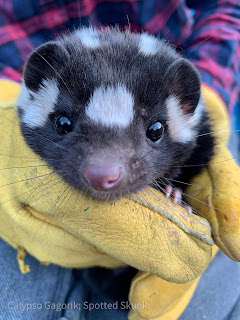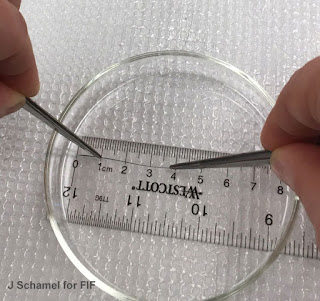Meet Julia Owen, a researcher at the University of California, Davis Mammalian Ecology and Conservation Unit.
FIF's 2022 Research Grant will help process samples in Owen's effort to decode the genome of island spotted skunks and determine their genetic history. When did this island endemic diverge from a mainland ancestor and which mainland spotted skunk is their closest ancestor?
Little is known of the island spotted skunk that shares habitat with island foxes on two islands–Santa Rosa and Santa Cruz. Because island spotted skunks are nocturnal and reclusive, basic knowledge like diet, social behavior, and even when these tiny predators reproduce remains unclear. Yet, island foxes and island spotted skunks have an impact on each other. More on foxes and skunks sharing habitat
Currently island spotted skunks (Spilogale gracilis amphiala) are considered a subspecies of western spotted skunks. Physically they all appear similar to human eyes and, until recently, the relationship between spotted skunks across North America has been regarded as primarily a division of western and eastern species. New genetic research, however, is revealing that there are substantial genetic differences and even reproductive variation between the two groups–western spotted skunks have delayed implantation of embryos and eastern spotted skunks do not. "Delayed implantation" means that spotted skunks in difficult desert, mountain, or isolated environments can breed at a time that is easier to find a mate, but the embryo within the female will stop development for a period of time and then resume development so that birth will occur at a more optimal time for success.
"Through the use of genetic and genomic tools, " Owen explains, "it is now becoming clear that island foxes and island spotted skunks have been coinhabitants of Santa Cruz and Santa Rosa Islands for thousands of years. Investigating the evolutionary history of island spotted skunks will also provide information on the evolutionary ecology of island foxes on the northern Channel Islands."
This work could also help us understand if island spotted skunks should be considered a unique island species, like island foxes. Julia Owen adds, "shedding light on the distinctness of each population of island spotted skunks may help inform and increase conservation efforts on each island."
Friends of the Island Fox participates in the Island Spotted Skunk Conservation Working Group. For more about island spotted skunks check out their website: www.islandspottedskunk.com
See Ellie Bolas talk on preliminary research on island fox and island spotted skunk interactions








